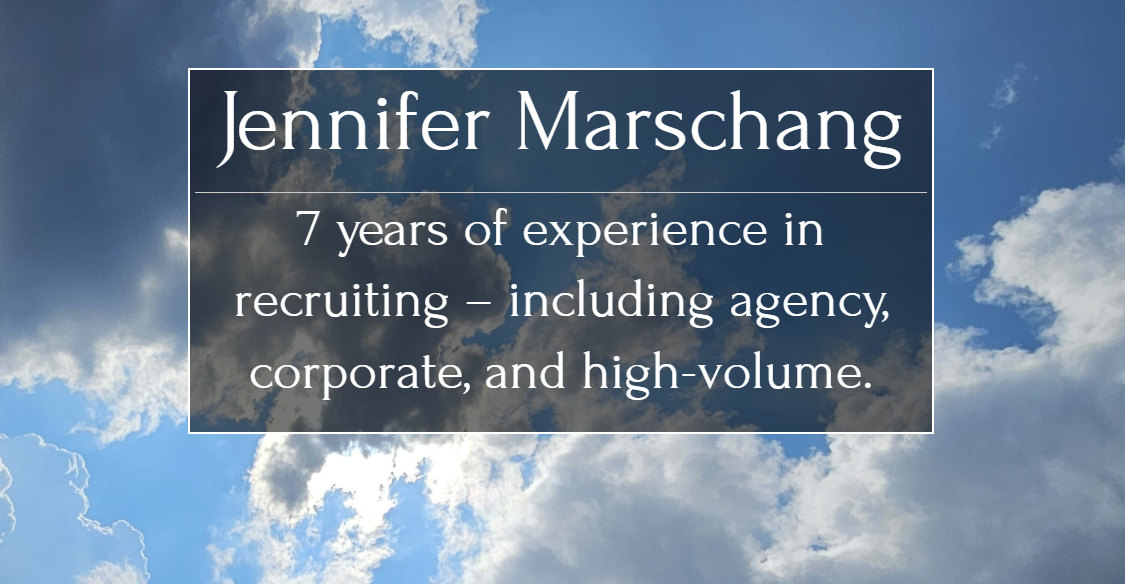
Highlights
If you want a quality response, you have to have quality input
[Resume/Application]
Come in confident. Don’t be cocky, but know you are worth this interview, and you are worth a chance being taken on you.
[Interview Mistakes]
Always follow up. Just follow up to the right person in the right way.
[Follow-Up]
The way you use LinkedIn matters.
[LinkedIn]
Keywords, while annoying, are very important on a resume.
[Transferable Skills]
I have success. I do things that make an impact. And I just started documenting everything I was doing.
[Senior vs Entry-Level]
Brag about yourself. Your application and your interview are your time to brag about yourself.
[Senior vs Entry-Level]
You’re the one who’s telling your story. You should make it a freaking exciting story.
[Senior vs Entry-Level]
Resume/Application
I asked Jennifer – What are ways that job seekers can get seen with their application – how can candidates stand out?
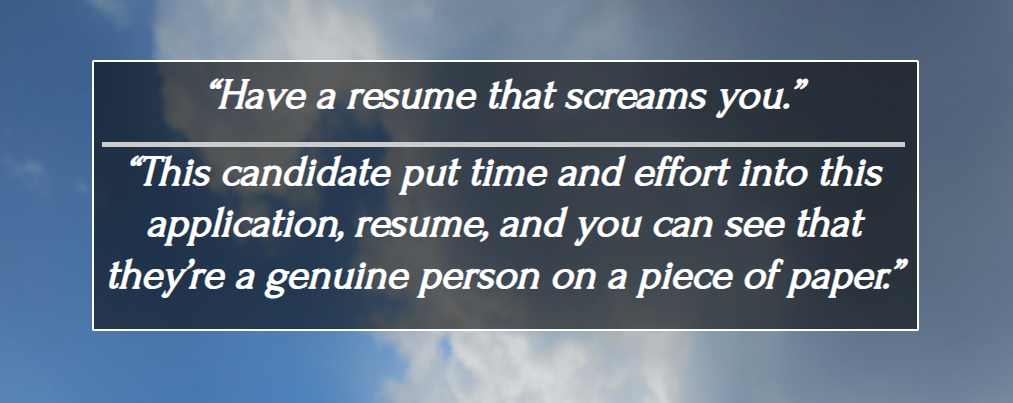
“I hate, hate cookie cutter resumes. We know AI made it. We know it was a boring template. We know you copy and paste the job titles. Those are not going to get you attention.
I don’t expect a masterpiece, but I want something that’s going to scream, this is a unique candidate.
That’s the best thing to do as far as just submitting the application.”
“Depending on the type of role, a way to stand out would be getting connected on LinkedIn. Connecting with recruiters or other people in the company and just interacting.
Not necessarily stalking anyone in the company or sending messages to anyone you can think of, but connect and interact on LinkedIn.”
Based on what you just said, are you against candidates reaching out to you or a hiring manager during the application process?
“I’m not against it. I think you need to be very strategic about how you do it and make sure you’re reaching the right people. In most cases it is more advantageous to reach out to the recruiter. I’d say the hiring manager will be harder to get a hold of unless you’ve known them for a while or you’re genuinely connected with them.”

“If you’re going to cold message someone on the team, make sure it’s the recruiter, even if it’s the wrong recruiter. A lot of times we’re not afraid to point you in the right direction, or if we like what we see, bring you up to the correct recruiter, but make it a:
‘Hi, how are you?’ Reaching out to say hello. I submitted an application.’
Not:
‘I applied. Can I have an interview?’
This is very off-putting. Be friendly.
If you’re qualified for the role and you look like a genuine person, odds are you’re going to hear back.
It’s when you’re not qualified, or it says on-site, but you live across the country, and you’ve not made a note that you’re relocatable – things along those lines are where people typically don’t see a response.
Or, they’re using these AI bots to apply to every single job with the word data. That’s not helpful. I’m all for AI, do not get me wrong.
Applications are a numbers game. Make sure you’re applying for jobs you’re qualified for.
Apply as early as you can from the time the job’s posted. If it’s up, it should still be available. That is not always the case as we know, but the earlier you can get in, the better.
Be open in your availability. When they do reach out to you, be available right away.
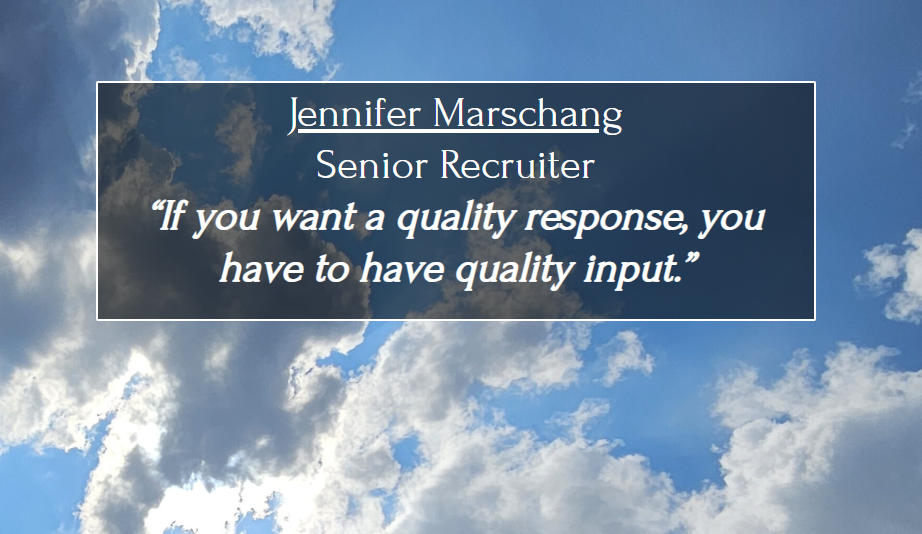
Interview Mistakes
What are common mistakes you find candidates make during interviews?
“Not being prepared. Know the name of the company, job description, name of recruiter/hiring manager.
At the end of the conversation don’t say ‘And what was your name?’ – at least know their name.
Come in confident. Don’t be cocky, but know you are worth this interview, and you are worth a chance being taken on you.
For the entry level roles, you can prove that you are a quick learner and that you are eager and you’re motivated.
If you doubt yourself, we’re going to doubt you and we’re not going to move forward.
Candidates need to come with questions. Don’t have to be the most elaborate questions but have some to build that conversation. You should be interviewing me as much as I’m interviewing you.
Not that I would say that that’s a make or break, but it could set you aside from somebody who did ask three to four quality questions either throughout or at the end versus being non-conversational and then at the end not having any questions.
They don’t have to be the most elaborate questions. It doesn’t have to be 20 questions, but asking a few questions to build that relationship, to build the conversation, deepen your understanding.
I think a lot of people forget that interviews are two-way streets.
I want you to give me a quality response that maybe I can elaborate on a little bit more with another question or give me an example or ask me how that question applies to the role.
Like: ‘Oh, you’re asking me if I have experience with workday? for example.
Instead of just saying ‘Yes’, say, ‘Yeah, I dabbled on that in my previous position. Is that what you guys are using?’ Just something to keep it going.
Red Flags
What are some red flags you see from candidates?
“I’m going to sound so anti-AI – I promise I’m pro-AI in certain ways, but using AI to do your interview for you, we know. We can tell. We can either hear you typing or we can hear the unnatural pause and the robotic responses, the undetailed responses. The response that lacks personality.
I want to know how YOU did this, not how you would do this or how it’s done, but how YOU did it.
Use AI to prep. Don’t get me wrong, use AI to help you practice your answers and things like that, but do not use AI to physically respond to the questions of the interview. Major red flag. Major. That’s an automatic ‘I’m not passing you forward.’ If it’s that obvious, it’s not happening.”
“Do not use AI to physically respond to the questions of the interview. Major red flag. Major. That’s an automatic ‘I’m not passing you forward.’ If it’s that obvious, it’s not happening.”
Green flags
How about some green flags you like to see from candidates?
“Tell me why this is your next step. Tell me why you applied for it.
Just be genuine in the fact that this is a position you could actually see yourself at, staying at, growing within. Not that you’re going to get it because you need a paycheck and then you’re going to keep looking and go somewhere else. No, there’s jobs like that, I understand, but still, show me you’re excited for this company in particular.”
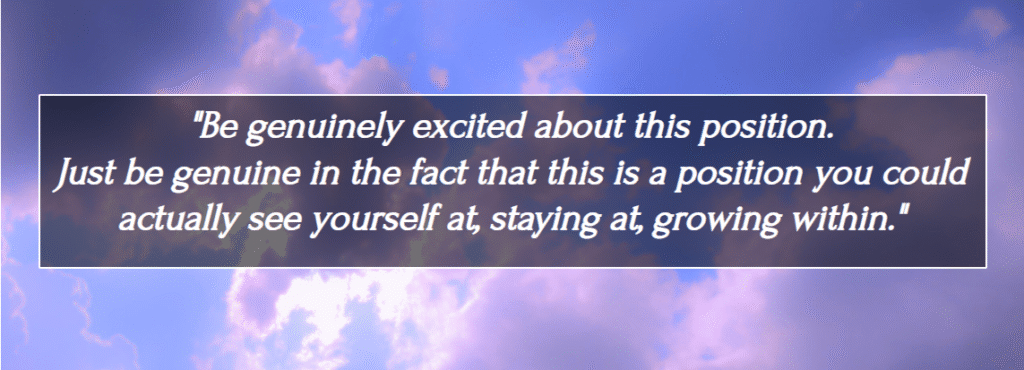
Stand-out Conversations
What are some stand-out conversations you’ve had with candidates?
Bad
‘What didn’t you like about anything I’ve said?’
‘Is there a reason you wouldn’t pass me forward?’
“It’s not that it was a bad question, but it has a negative connotation. We just had this conversation, and now we’re ending it on a negative note. And that kind of goes back to that whole confidence piece. Instead, phrase it like:
Is there anything you’d like me to elaborate on before we go?
Is there anything that I should look to research or dive into to be prepared for the next round?
That’s an opportunity to talk about those things, but we’re not showing it in a negative light.
Good
One of my favorite questions is when people ask me either why I came to the company or why I stay at the company. I believe this should be any company you’re looking to go to.
You want to work there because you want to work there, right? You want to work there because the culture is good, the people are good. It’s of genuine interest to you.
So, when I get to tell my story and show how passionate I am about our culture and about our people and about what we do, I feel like that really helps build that connection and it helps elongate that conversation as well.
Additionally, I love when people ask about the accomplishments the company has had, whether they notate some that they saw on the company website, or they just ask in general:
‘What has the company accomplished?’
‘What are some good things that have happened here? ‘
“Again, it goes kind of more into that culture piece, and I feel like that’s an area where everybody forgets about it in the interview, but then it’s all they care about when they get in the job. Look at that culture piece from day one.”
Follow-Up
If a candidate applies to a position, maybe even interviews, but hasn’t heard back, do you think they should reach out to you or a hiring manager?
“If you have applied and haven’t heard back? No.
Especially because you never know how many applications came through.
I had 500 applications in 24 hours for an IT position. I could hit a button and respond to all of those [with a generic response], but I’m going to take my time to go through and I’m going to do my best to get you a response.
Not everyone is good about it, unfortunately. It’s just a downside of recruiting and the hiring process.
But if you have been interviewing or you’ve had a conversation with recruiters, then absolutely, follow up. Yes, but follow up with the person who made the initial contact. Follow up with the person who’s been doing the main coordinating. It’s usually the recruiter, recruiting coordinator, sourcer, or something along those lines. Second, send them an email.
I always tell people at the end of every interview that if they have not heard from me by a certain day, please send me an email so we can at least touch base.
I’m the worst at returning voicemails. I spend my day on the phone and, lot of times the calls go to spam or people don’t leave voicemails.
Please send me an email. Even if I’m doing five other things, I’m going to see it and it’s not going to move out of my inbox until I’ve addressed it.”
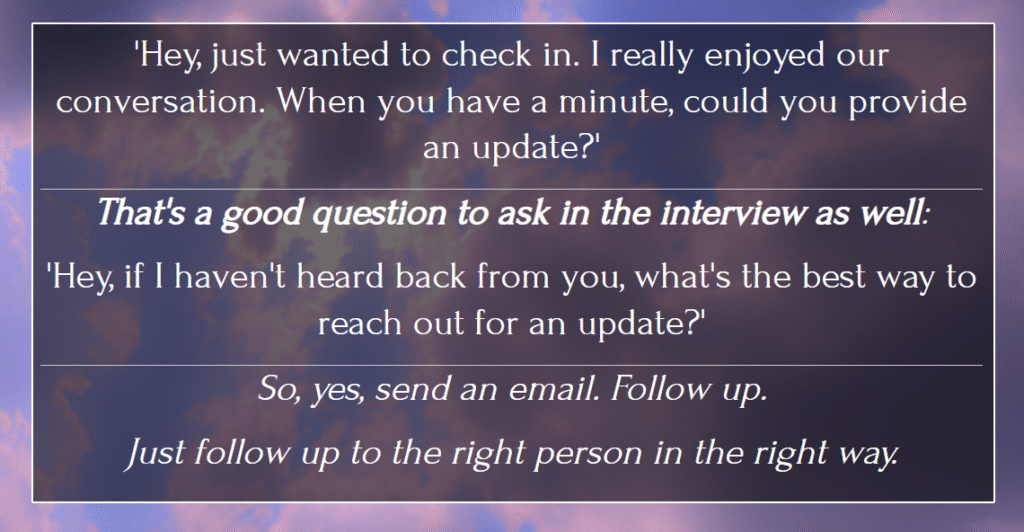
“I love LinkedIn. I didn’t always. I would say it’s probably been the last three years or so that I’ve really started to love LinkedIn and that’s because I started to understand it is what you make it.
It’s the same as the real world – If you surround yourself with the people that you want to be like then that’s where you’re going to gravitate towards.
I avoid anyone who’s extremely negative or, you know, anyone who’s crap talking something that’s just completely inappropriate.
So, the way you use it matters, but I also think it matters on what you’re trying to accomplish.
I’m literally in the middle of nowhere, and so my opportunities for what I want to do are extremely limited. Thankfully, I was able to find a fully remote position and that has gotten me so very far. And if I ever wanted to move on to another company for any reason, I know I would have to look for another remote opportunity because I can’t move.
That’s where my LinkedIn usage matters. Because I’m building this network should I ever need and that’s going to open so many doors for me.
Now, if you’re not in a role that requires networking or connections or you’re in a big city and you don’t rely on the Internet to find your next opportunity, I don’t think it’s that important.”
“I have this checklist of things I avoid and in doing so I’ve built this amazing network of positive, motivational, hilarious people and I’ve been able to develop my own kind of brand. I define it as corporate chaos because I’m completely unhinged, but also extremely professional.”
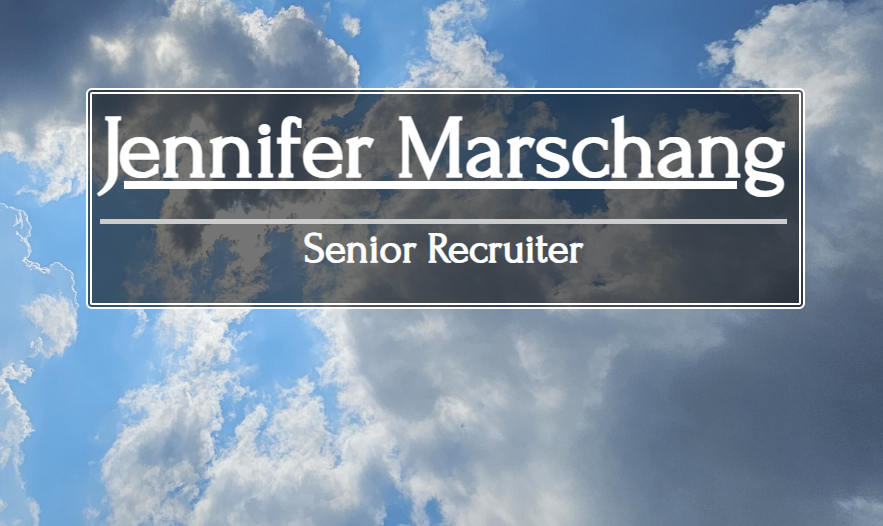
Transferable Skills
What are some ways job seekers can better showcase their transferable skills?
“It’s hard. That is a one area where LinkedIn would come into play.
Start surrounding yourself with people in that industry, doing a lot of research to find out what skills that industry looks for. And then, look within yourself to see, what do I have that is transferable? What could that look like?
We search and filter on them constantly as recruiters. Knowing what keyword needs to be changed into a different keyword is going to be helpful.
If you have the time and the opportunity. Take some courses, take get some certifications, little things like that.
For those certifications and such, should they be put on the resumes?
“I am all for it. Put it on there. I’m a little scattered in my certifications. It’s something that, over the last year or two recently, I started to dabble into and I’m putting it on there. It looks a little random, honestly.
It again, it shows my curiosity, it shows my effort. Don’t make it the star of the show, but put it on there. Put it down there with your education. Add the certificate to LinkedIn.
I mean, yeah, I have mine on there. They may seem random, but again, it shows my eagerness, it shows my openness to adoption of AI and my understanding of it.
Even though I’m not an IT person, because of that confidence factor, when I am interviewing someone, they’re looking at my profile like, ‘Oh, she’s done an Oracle IT Certificate. She understands the language I’m about to use, so we can have a deeper conversation at that point because I understand what they’re saying.'”

“I definitely believe LinkedIn should be the ‘funner’ version of your resume. It shouldn’t necessarily mimic it, but it should mirror it almost.”
“Don’t ever, ever assume you didn’t get the job. Do not send that email saying:
‘Since I haven’t heard back, I’m assuming I didn’t get the position.’
Oh, no, don’t do that.
Because if a decision hasn’t been made and you were on the consideration list, I guarantee you that just knocked you down a little bit.”
Senior vs Entry-level Resumes
You’ve recruited for a lot of directors and high-level managers. Is there anything that you notice they do better [compared to entry-level applicants] or more of as far as interview prep, or their resumes look a little bit different this way or that way kind of thing, anything like that that stands out to you?
They quantify their success and their impact. They not only talk about, but they write on their resumes what they’ve done. It’s really important, they highlight:
What have you done?
How have you done it?
What have you used to do it?
Who did you do it for and what were the results?
“Those are things that they’re showing and they’re talking about that portray that confidence, that portrayed that they’re good at what they do.
If it’s a salesperson:
They obtained 1.3 billion in successful sales in 2024, through this facet of the company, they managed three ops people, have these operational results at this percentage level. They’re quantifying their success. They’re not just talking about their responsibilities.”
Yeah, that’s always been something I personally struggled with. I guess maybe that’s just my brain not being good at math, but quantifying everything. Sometimes it’s hard to measure things, you know?
“Yeah, I struggled with that too at first. It wasn’t really until I stepped into this newer position two and a half years ago that I really started to think that it mattered. I interviewed people knowing it mattered, but I didn’t think it related to me.
But I’m like, no, I have success. I do things that make an impact. And I just started documenting everything I was doing.”
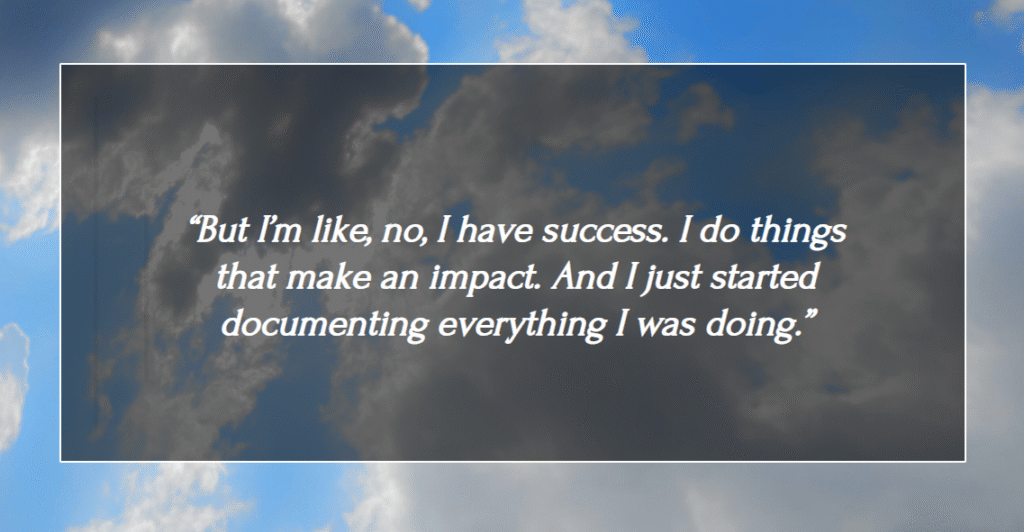
“I was tracking all of my open positions, tracking when they opened, when we made a decision, when we had a signed offer and when they started, and tracking all of those metrics, tracking if they turned over, how long did they last in the role, what was the reason that they turned over. And not only did that help me compete against myself, like, ‘oh, I want to lower my time to fill rate.’
But it’s also like, okay, this one hiring manager I’ve worked with, we have double the time to fill rate than any other hiring manager. Why? What’s going on in this department or our process here? What’s. What’s not working? Why can’t this position be filled in this amount of time? It really helps that.”
I do it all throughout the year, and then at the end of the year when you hit that little lull, I go through and I just start analyzing it.”
“I use an Excel formula – it’ll automate a lot of things for me. I look at and analyze the data, then put it on paper, my resume, and on my LinkedIn profile.
Tracked my Indeed Response rates and put that on there, my 70% response rate.”
That’s really high.
“You know, I knew it was high at first, and I was happy about it. I made all of my templates.
I didn’t put that on there actually until one of our reps told one of my colleagues to reach out to me because they saw that I had that high of a rate on their end.
And I was like, ‘Oh, wow. This matters.'”
“So, you never know. Look at everything you do and find a number to associate with and just write it down and just start tracking it and play with it. You never know how it’s going to matter.
Then do an evaluation of yourself every six months, every year. Write it down.”
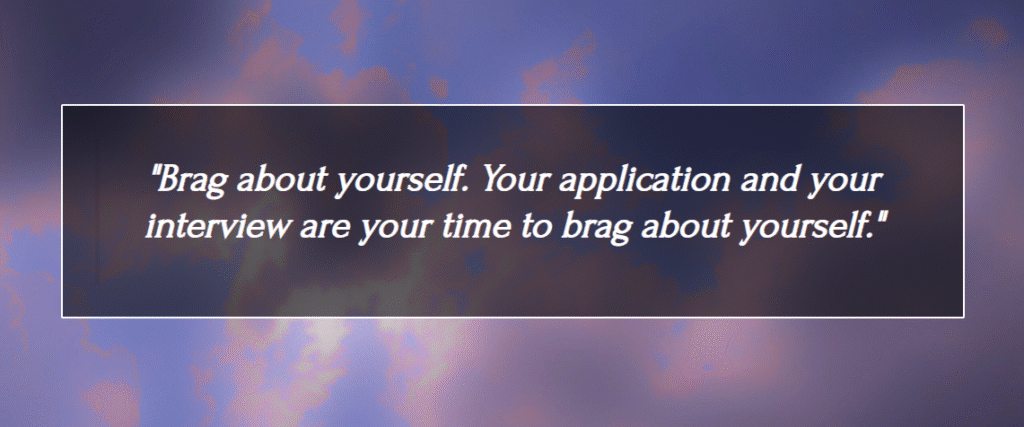
“It’s hard when you don’t like to talk about yourself or you don’t like to brag about yourself.
At the end of the day, you’re the only one who is going to help you get that next position.
You may have referrals.
You may have people who put in a good word.
But, at the end of the day –
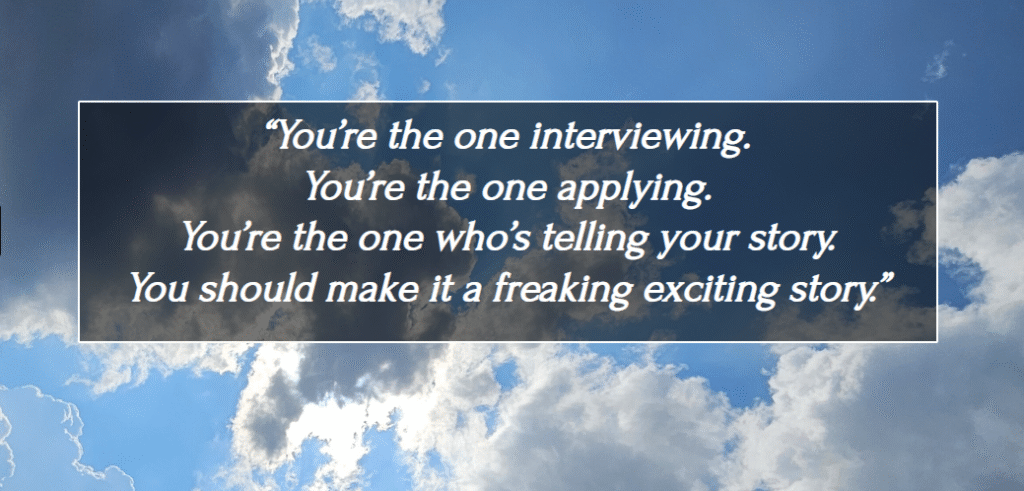
Wow. Awesome. I never even thought about that. You’re right. This was amazing.
“Honestly, people don’t understand [recruiting]. If you’ve never done it, you never will understand it. But being able to shed this light on what we do, I think is so extremely helpful.”
Thank you, Jennifer, very much, for meeting with me!
Thanks for visiting!
This page brought to you by the following cloud picture.
